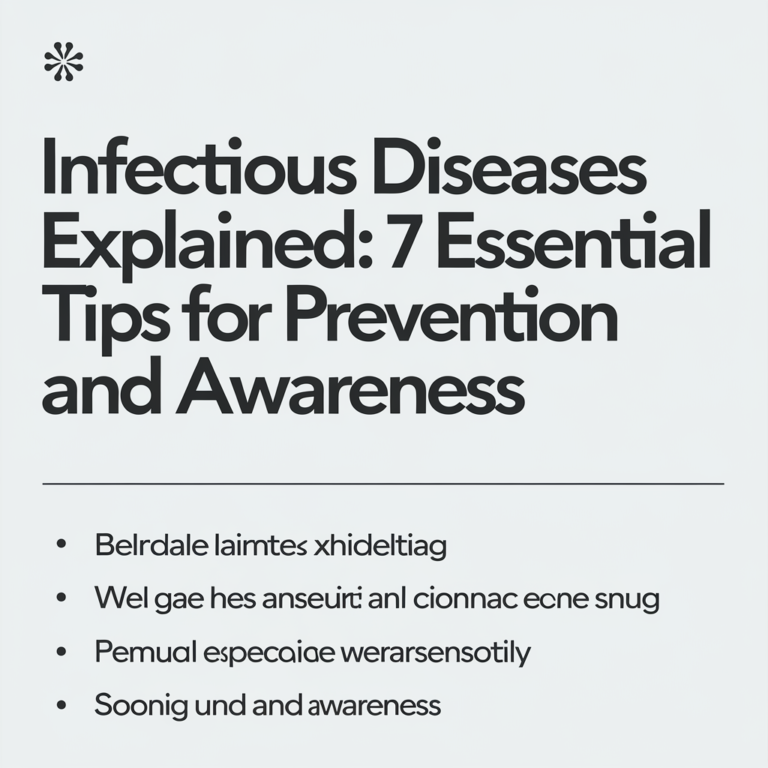
"Stay informed and stay healthy! Check out our guide on powerful treatments for infectious diseases."
Infectious diseases remain a significant global health challenge, affecting millions of people each year. These diseases can be caused by various pathogens, including bacteria, viruses, fungi, and parasites. Understanding the treatment options available for these infections is crucial for effective management and prevention. This article provides an in-depth look at the different types of infectious diseases, their treatments, and answers to common questions about infectious disease management.
Understanding Infectious Diseases

Infectious diseases can be broadly categorized based on the type of pathogen responsible for the infection:
- Bacterial Infections: These are caused by bacteria, single-celled organisms that can multiply in the body. Examples include strep throat, tuberculosis, and bacterial pneumonia.
- Viral Infections: Caused by viruses, which are smaller than bacteria and require a host cell to replicate. Common viral infections include influenza, HIV/AIDS, and COVID-19.
- Fungal Infections: These infections are caused by fungi, which can be single-celled (like yeast) or multi-celled (like mold). Examples include athlete’s foot and candidiasis.
- Parasitic Infections: Caused by parasites that live on or in a host organism, deriving nutrients at the host’s expense. Examples include malaria and giardiasis.
Common Treatment Approaches

1. Antibiotics
Antibiotics are a key treatment for bacterial infections. They work by either killing bacteria or inhibiting their growth. It’s essential to use antibiotics appropriately to combat the growing issue of antibiotic resistance.
Types of Antibiotics:
- Penicillins: Effective against many common bacterial infections. Examples include amoxicillin and penicillin.
- Cephalosporins: Broader-spectrum antibiotics effective against a variety of bacteria.
- Macrolides: Such as azithromycin, often used for respiratory infections and some sexually transmitted infections.
Common Bacterial Infections Treated with Antibiotics:
- Streptococcal Infections: Often treated with penicillin or amoxicillin.
- Bacterial Pneumonia: May require broader-spectrum antibiotics depending on the causative agent.
2. Antivirals
Antiviral medications are designed specifically to treat viral infections. Unlike antibiotics, antivirals target specific stages of the viral lifecycle, preventing replication.
Examples of Antiviral Medications:
- Oseltamivir (Tamiflu): Used to treat influenza; effective if taken within the first 48 hours of symptom onset.
- Antiretroviral Therapy (ART): For managing HIV infection, ART helps control the virus and improve quality of life.
Viral Infections and Their Treatments:
- Influenza: Treated with antivirals like oseltamivir.
- HIV/AIDS: Managed with a combination of antiretroviral drugs.
3. Antifungals
Fungal infections require antifungal medications, which can be topical or systemic, depending on the infection’s severity.
Types of Antifungal Medications:
- Topical Antifungals: Used for superficial infections like athlete’s foot and ringworm.
- Systemic Antifungals: Such as fluconazole or voriconazole, used for more severe infections.
Common Fungal Infections Treated with Antifungals:
- Candidiasis: Treated with fluconazole or other antifungal agents.
- Aspergillosis: Requires systemic antifungals like voriconazole.
4. Antiparasitics
Antiparasitic medications are used to treat infections caused by parasites. These medications are often specific to the type of parasite involved.
Examples of Antiparasitic Medications:
- Chloroquine: Used for treating malaria.
- Metronidazole: Effective against giardiasis and certain types of bacterial infections.
Common Parasitic Infections:
- Malaria: Treated with artemisinin-based combination therapies (ACTs).
- Giardiasis: Often treated with metronidazole or tinidazole.
Supportive Care
Supportive care is crucial in the management of infectious diseases, as it helps alleviate symptoms and improve patient comfort. Supportive care measures include:
- Hydration: Maintaining fluid balance is essential, especially in cases of diarrhea or vomiting.
- Pain Relief: Over-the-counter medications like acetaminophen or ibuprofen can help manage pain and reduce fever.
- Nutritional Support: Ensuring adequate nutrition to support recovery is important, particularly in severe infections.
Importance of Accurate Diagnosis
Accurate diagnosis is critical for effective treatment. Healthcare providers use various methods to diagnose infectious diseases, including:
- Laboratory Tests: Blood tests, cultures, and polymerase chain reaction (PCR) tests help identify the specific pathogen.
- Imaging Studies: X-rays or CT scans may be used to assess the extent of an infection, especially in cases of pneumonia or abscesses.
Preventive Measures
While effective treatment is vital, prevention is equally important in controlling infectious diseases. Key preventive strategies include:
- Vaccination: Vaccines can prevent many infectious diseases, reducing the incidence of illnesses like influenza, measles, and hepatitis. The CDC provides resources for vaccination schedules and information.
- Hygiene Practices: Regular handwashing, safe food handling, and maintaining respiratory hygiene can prevent the spread of infections.
- Public Health Initiatives: Monitoring and controlling outbreaks through public health measures are vital for community protection. Organizations like the World Health Organization (WHO) play a key role in global health initiatives.
Conclusion
Treating infectious diseases requires a comprehensive approach that includes accurate diagnosis, appropriate antimicrobial therapy, and supportive care. Understanding the types of infections and their respective treatments is essential for effective management and prevention. By staying informed and prioritizing preventive measures, individuals can protect themselves and contribute to public health efforts against infectious diseases.
FAQs About Infectious Diseases
- What are the most common treatments for bacterial infections?
- Bacterial infections are primarily treated with antibiotics, such as penicillin or azithromycin, depending on the infection type.
- How do antiviral medications work?
- Antiviral medications target specific stages of a virus’s lifecycle, preventing it from replicating and reducing the severity of the infection.
- What should I do if I suspect I have an infectious disease?
- If you suspect an infection, consult a healthcare provider for diagnosis and appropriate treatment. Early intervention can prevent complications.
- Are all fungal infections treated the same way?
- No, treatment varies based on the type and severity of the fungal infection. Topical antifungals may be used for superficial infections, while systemic antifungals are required for more severe cases.
- What preventive measures can I take to avoid infectious diseases?
- Key preventive measures include vaccination, practicing good hygiene, safe food handling, and following public health guidelines.






